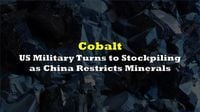On August 25, 2025, a flurry of announcements and policy shifts underscored just how high the stakes have become in the global race for critical minerals—those metals and elements essential for everything from smartphones and electric vehicles to advanced military technologies. As the United States and its allies scramble to secure domestic supplies, Canada’s mining sector, U.S. government agencies, and private companies are all moving rapidly to address mounting geopolitical and economic pressures, particularly those stemming from China’s dominance of the market.
One of the headline developments came from Vital Metals, the Australian owner of the Nechalacho rare earths property in Canada’s Northwest Territories. According to a company press release cited by Cabin Radio, Vital Metals is set to sell more than 40 percent of its shares to U.S. investors. Specifically, the company will transfer a 19.52-percent stake to Strategic Resources—a U.S. firm spun out of Measurement Technology Laboratories in Minneapolis—for $2.69 million. An additional 25 percent will go to other accredited American investors for $3.4 million, pending shareholder approval. The influx of capital is earmarked for drone surveys, exploration, and, crucially, an updated mineral resource estimate and pre-feasibility study. Such groundwork is necessary for transforming Nechalacho from a demonstration mine into a large-scale operation.
But this isn’t just about digging deeper. Vital is betting on what it calls “dry field force extraction” technology, aiming to make mining at Nechalacho both more economically viable and less environmentally taxing. Trials of the new method are expected to begin next summer, and the agreement gives Strategic Resources two seats on Vital’s board. Zane Lewis, one of the current five board members, will step down as part of the deal. Lisa Riley, CEO of Vital, expressed optimism, stating the partnership would allow the company to test the technology’s potential “to be an economic game-changer.” Strategic Resources’ David Dikken echoed the sentiment, saying, “We look forward to working with Vital to move this key North American resource into viable economic production.”
This latest U.S. investment comes on the heels of a controversial 2023 sale of a Vital stake to a Chinese firm—a move that triggered calls for federal intervention in Canada and led to the involvement of a Crown corporation to block some Nechalacho ore exports to China. While that Chinese stake reportedly remains, it may be diluted by the new U.S. funding. The broader context is clear: North American governments and companies are racing to reduce their dependence on Chinese-controlled supply chains for critical minerals.
That urgency is mirrored in Washington. On the same day as the Vital announcement, the U.S. Defense Department revealed plans to buy up to $500 million worth of cobalt for strategic stockpiles over the next five years—a move not seen since 1990. As reported by Bloomberg and Stars and Stripes, the Defense Logistics Agency issued a tender for up to 7,500 tons of alloy-grade cobalt, restricting bids to a trio of major players: Vale SA’s Canadian unit, Japan’s Sumitomo Metal Mining, and Norway’s Glencore Nikkelverk. Cobalt, once valued mainly as a coloring agent for ceramics, is now indispensable for batteries in tactical radios, electric vehicles, and advanced aircraft engines. The Pentagon’s stockpiling is a direct response to China’s tightening grip on mineral markets; Beijing controls about 85 percent of rare earth element refining and has recently imposed export restrictions on several strategic materials.
The U.S. is particularly vulnerable, as more than half of the world’s cobalt processing capacity is in China. The Defense Department’s latest move follows a $15 million agreement in June with Jervois Global Ltd. to study cobalt extraction in Idaho. However, the only U.S. cobalt mine closed in 2023 due to falling prices, highlighting the fragility of domestic supply. Meanwhile, global cobalt prices have surged nearly 34 percent over the past year, partly because of supply disruptions in the Democratic Republic of Congo (which produces about 70 percent of the world’s cobalt) and a four-month export ban by the DRC earlier in 2025.
Against this backdrop, Canadian companies are also acting to shore up domestic sources of other critical minerals. Quantum Critical Metals Corp., based in Vancouver, announced its application to expand the Victory Antimony Property in Haida Gwaii, British Columbia, to 1,444 hectares. The Victory project, first discovered in 1988, is rich in antimony—a mineral used in flame retardants, lead-acid batteries, ammunition, and semiconductors, with growing applications in defense and energy storage. According to Quantum’s CEO, Marcy Kiesman, “Securing reliable sources of antimony is becoming more important than ever. By expanding the Victory Property to cover the known Minfile showing, we demonstrate our commitment to building a resilient, domestic supply chain for critical minerals.”
Quantum’s expansion comes at a critical time. China, which produces over 70 percent of the world’s antimony, banned exports of the metal to the United States in December 2024, citing its dual military and civilian uses. The U.S. Department of Defense has since designated antimony as a critical mineral, and governments in both the U.S. and Canada are prioritizing domestic production to mitigate supply chain disruptions. Quantum recently closed a private placement, raising approximately $2 million to fund further exploration and development. The company plans to initiate access development, geological mapping, and outcrop sampling as soon as approval is granted.
Critical metals like antimony, cobalt, and rare earth elements are at the heart of this new resource scramble. Both the U.S. and Canada have compiled lists of minerals deemed vital for national security and economic stability. The U.S. Geological Survey’s 2022 list includes 50 critical minerals, while Canada’s 2024 strategy names 34. The West’s vulnerability has been thrown into sharp relief by China’s export bans—not only on antimony, but also on gallium, germanium, tungsten, indium, bismuth, tellurium, and molybdenum in recent months. These metals are essential for everything from defense systems and renewable energy technologies to consumer electronics.
Industry experts and government officials alike are warning that without a more secure and diversified supply chain, the U.S. and its allies could find themselves at a strategic disadvantage. The rush to invest in new technologies, expand mining operations, and build up stockpiles is a direct response to the shifting geopolitical landscape. As one observer put it, “The global race for critical minerals isn’t just about economics—it’s about national security, technological leadership, and who gets to write the rules for the industries of tomorrow.”
With new investments, technology trials, and government interventions all unfolding at a rapid clip, North America’s critical minerals sector is bracing for a future where security of supply is as important as the metals themselves. The coming years will likely determine whether these efforts can keep pace with demand—and with the complex, often unpredictable forces shaping the world’s mineral markets.


